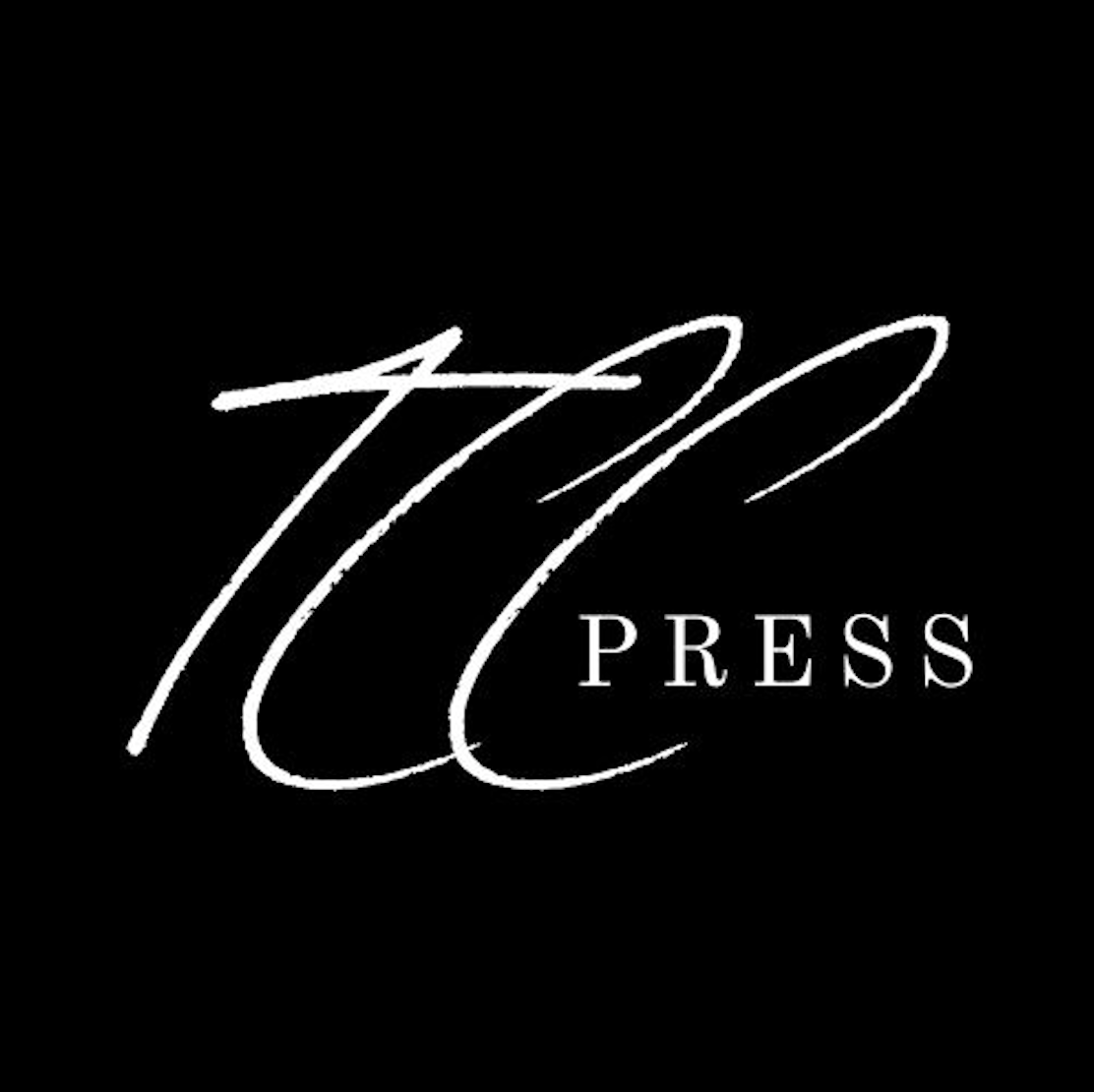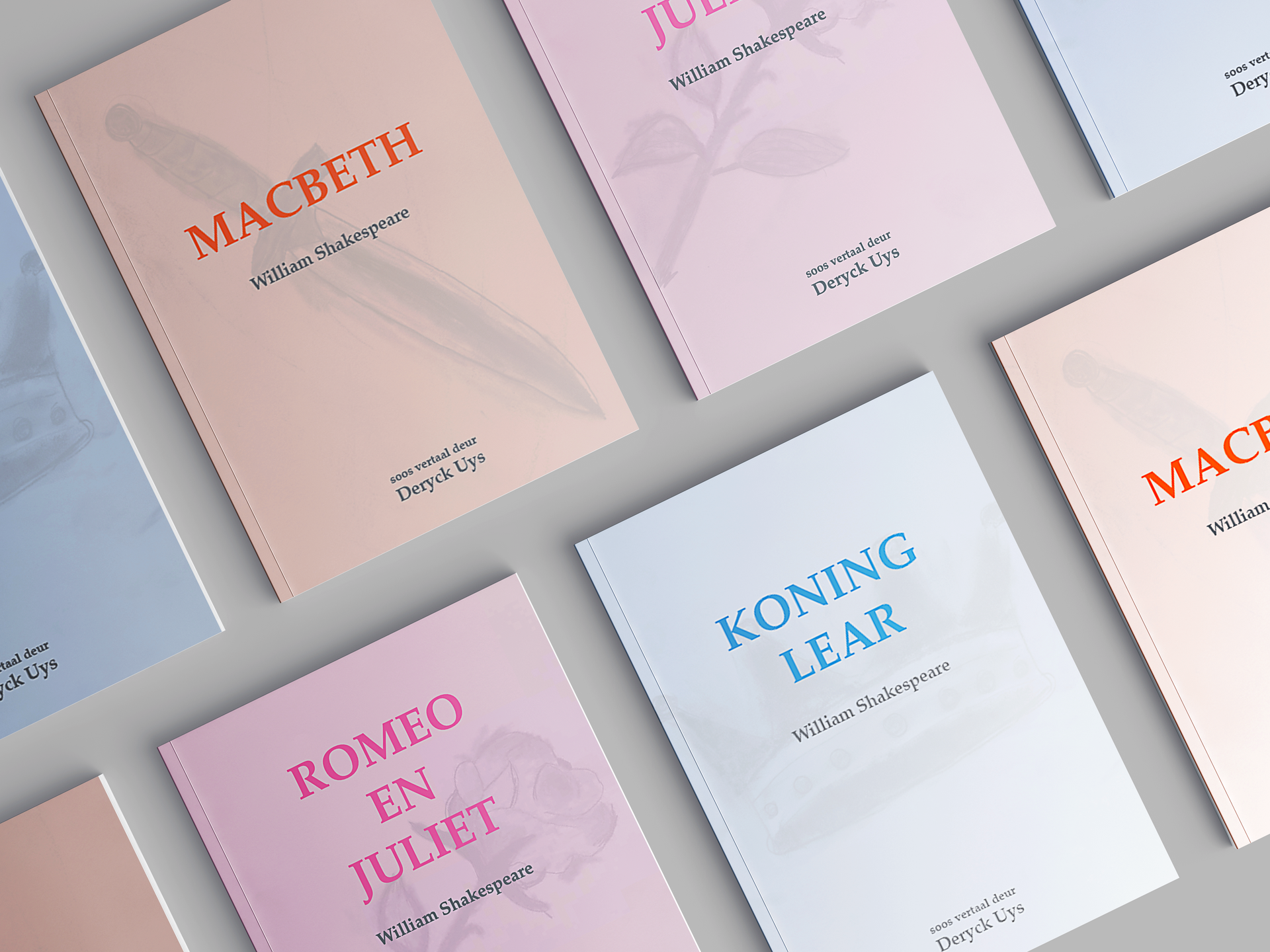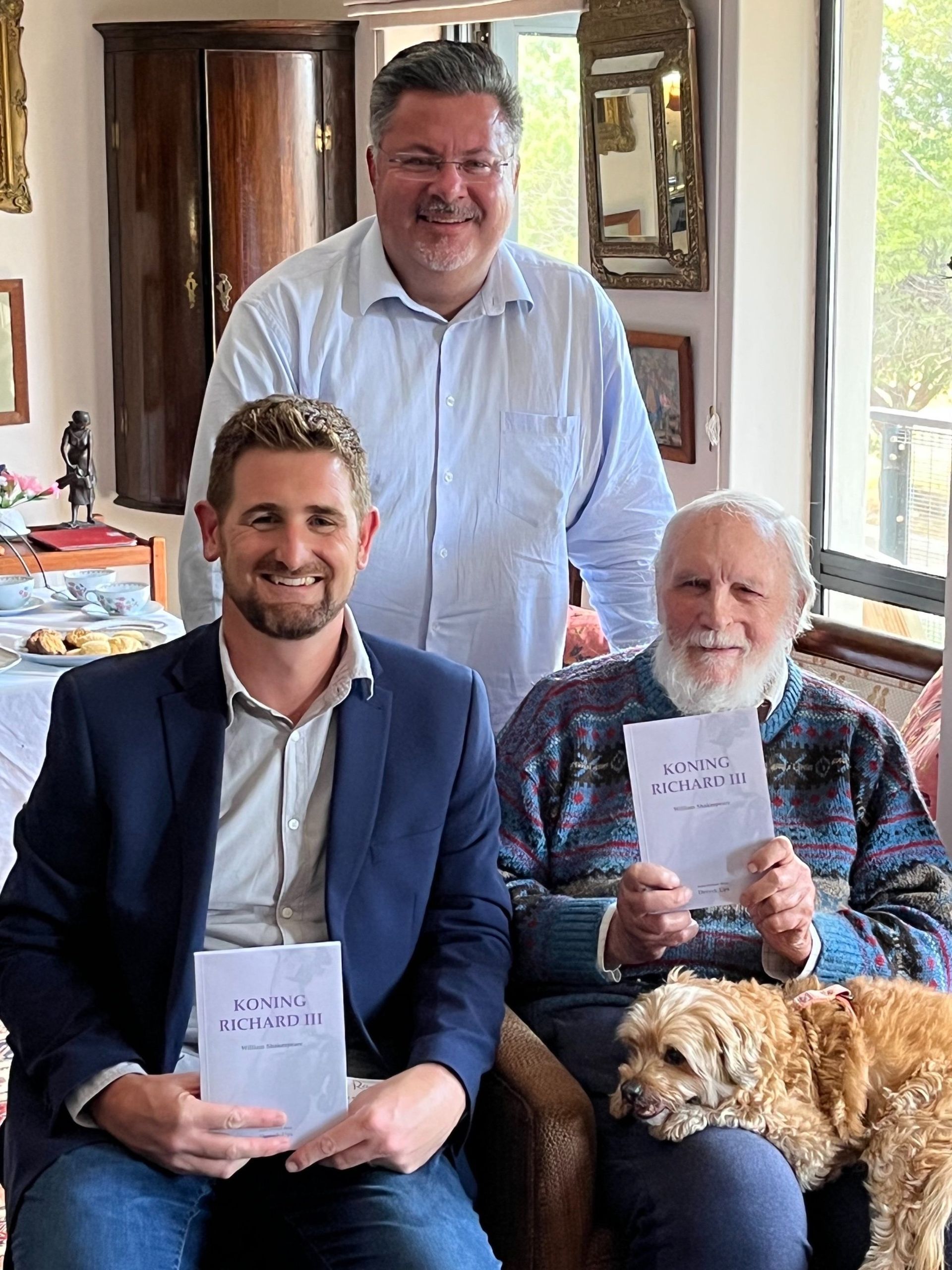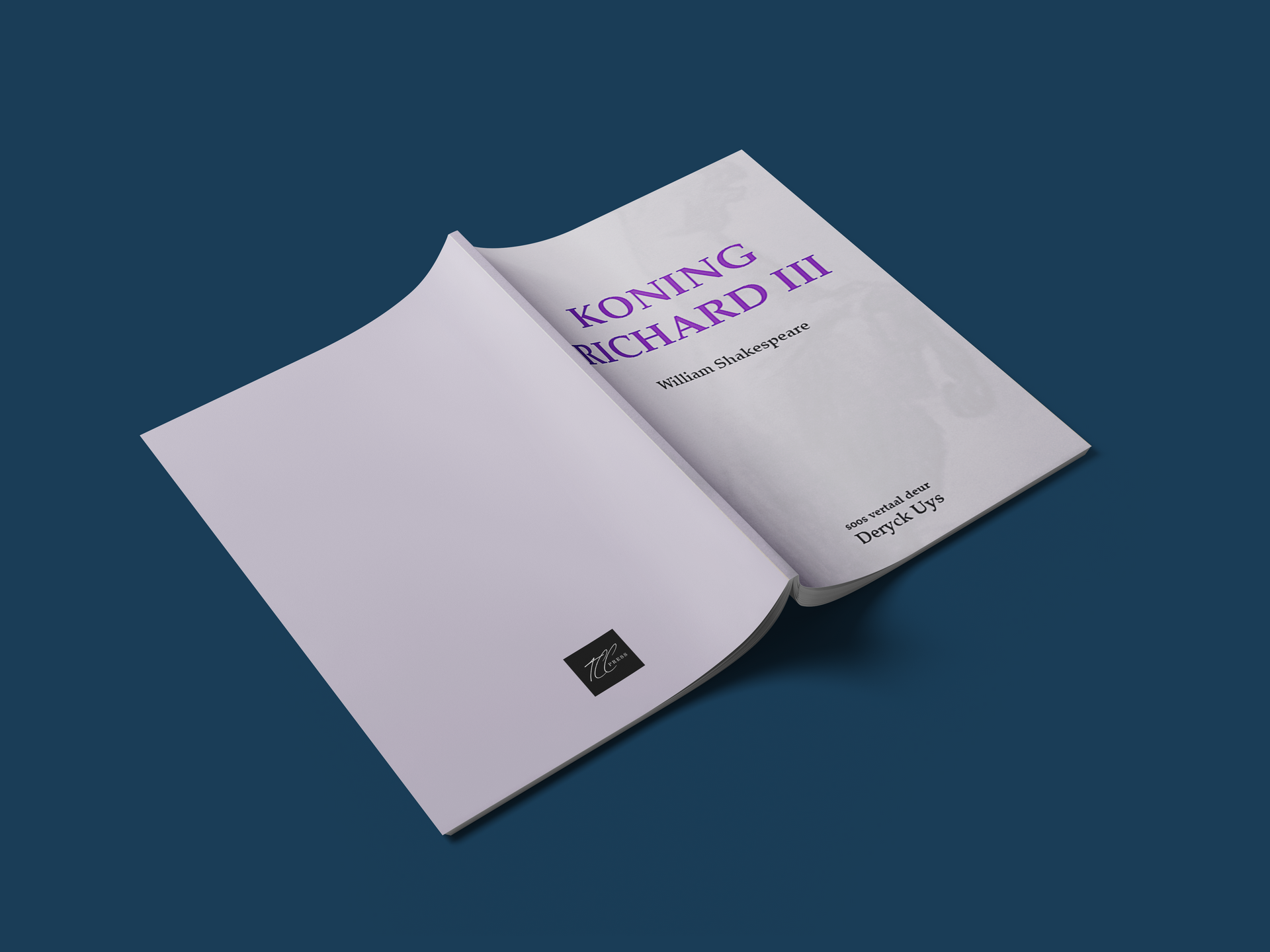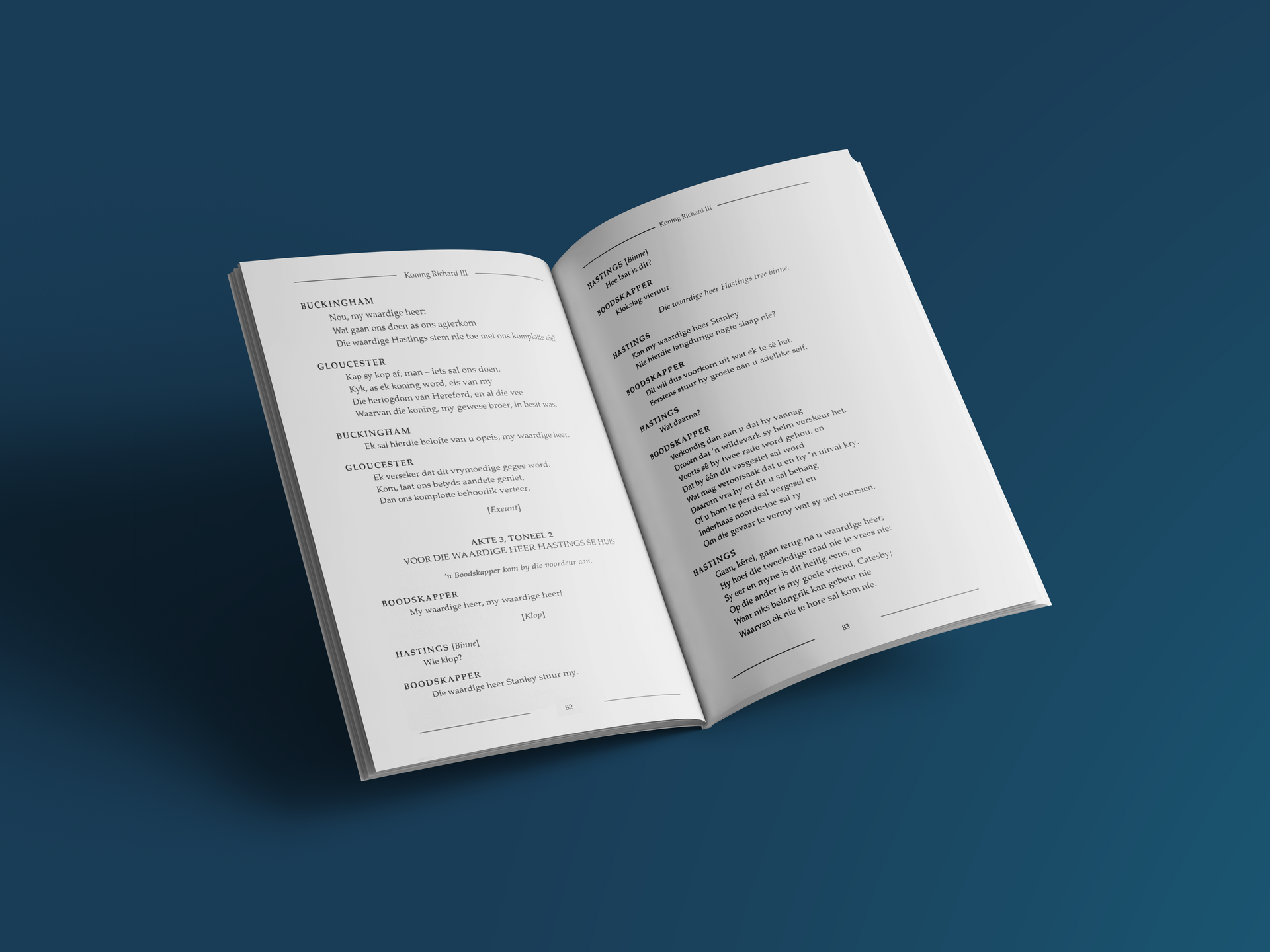“The translations must stand alone, as works of art in their own right. The poet paints pictures for the inward eye and composes music for the inner ear.”
Deryck Uys
Afrikaans Shakespeares.
A Legacy project.
There is a rich and complex history of “Afrikaans Shakespeares,” both on the page and on the stage. The Tsikinya-Chaka Centre has previously collaborated with Shakespeare ZA to digitise and make publicly accessible a selection of translations of Shakespeare’s plays into South African languages; this will be expanded into one of the TCC’s flagship projects, the Sol Plaatje Archive of Shakespeare in African Languages. Afrikaans material is a cornerstone of both the Shakespeare ZA exhibition and the planned Sol Plaatje Archive, affirming the place of Afrikaans among other African languages.
Contestation over the “identity” of Afrikaans – and of those who speak the language – has manifested in the practice of translating Shakespeare. Figures like Andre P. Brink, Uys Krige and Breyten Breytenbach loom large here, and theatre historians have shown how performances of these translations further complicated the political dimensions of Shakespeare in Afrikaans.
Both building on and critiquing this tradition, the TCC and its network of theatre makers, scholars, educators, language practitioners and activists will be engaging with what it means to study and perform Shakespeare in Afrikaans today. With Legacy’s support, and under the imprint of TCC Press, we will be publishing new Afrikaans versions of many of Shakespeare’s plays by prolific translator Deryck Uys.
The TCC will also be promoting the work of practitioners translating and performing Shakespeare in Kaaps and contributing to research into (and advocacy for) Kaaps not just as a “dialect” of Afrikaans but as a formalised language of cultural production.
Chris Thurman during an interview on RSG’s Skrywers en Boeke with Ilse Salzwedel states: “We are very fortunate. Our supporters, Legacy Cultural Foundation, they have been very, very generous in supporting this work and we are very grateful to them. They are committed to supporting – not just the Afrikaans language and artists and translators working in Afrikaans, but the work of the centre as a whole, which is a way of situating Afrikaans alongside other South African languages as languages that are not in need necessarily of support, but merit the
celebration and the affirmation that can come with reminding people that to engage with Shakespeare, first of all, doesn’t need to happen in English, and second of all, often actually, shouldn’t happen in English. In fact, there is a well-known South African ‘scholar,’ David Schalkwyk, one of our foremost Shakespearians, whose made the argument that if somebody can only engage with Shakespeare’s plays in the English language, their experience of Shakespeare is impoverished.”
Shakespeare was not, and has never been, an exclusively ‘English’ playwright. He drew on stories and poetry that he had encountered either in other languages or in translation from those languages. His plays are full of words and phrases quoted, borrowed, or adapted from other languages, as he experimented with (and helped to shape) what we now refer to as early modern English. While he was still alive, his plays were being performed in non-Anglophone contexts; soon they would be translated for audiences and then, over time, for readers. It started with Dutch and German. It continued with Russian and French – and Mandarin, Bengali, Setswana, Kiswahili, Yoruba.
Now the Tsikinya-Chaka Centre, under the imprint of TCC Press, will contribute to this remarkable multilingual tradition of adaptation and appropriation with the contribution of work in Afrikaans made possible by Legacy. This will strengthen the overall TCC contribution focusing on African languages. The first published translations of Shakespeare’s plays into African languages appeared in the 1930s (through the pioneering work of Sol Plaatje in South Africa and E.T. Johnson in Nigeria). Over the course of the next century, dozens – even hundreds – of African-language translations were produced. Through the
Sol Plaatje Archive of Shakespeare in African Languages, the Tsikinya-Chaka Centre digitises and collects these texts in order to make them more accessible. TCC Press is committed to publishing new translations, in both print and e-book format, demonstrating the range of Shakespearean translation across the continent in recent years.
About the Translator.
Deryck Uys.
Deryck Uys was born in Aliwal North, South Africa, in 1926. His family moved to Germiston and, when his father was called up for service during the Second World War, Deryck attended Pretoria Boys High and then Parktown Boys High. He finished his schooling at Potchefstroom Boys High, where he won the prestigious Hope Essay Prize; he used the prize money to buy the complete works of Shakespeare and several volumes of poetry.
He passed his attorney’s admission examinations at the age of 19. From 1948 to 1952 he worked on a gold mine and assisted on tobacco farms in what was then Southern Rhodesia. Living alone in a remote part of the Zambezi Valley, he read widely in English and Afrikaans literature – and he began translating Afrikaans poetry into English.
In the 1950s, Uys attended an Afrikaans production of Hamlet that used L.I. Coertze’s translation; later, he was deeply impressed by Uys Krige’s Twaalfde Nag (1967). This spurred his desire for “Afrikaans people to appreciate English poetry and English people to appreciate Afrikaans poetry”. He did not, however, have time to pursue his passion for translation. For half a century, he practiced as an attorney-notary and conveyancer. He also lectured at UNISA and the University of Cape Town, and he was influential in the computerisation of the South African legal profession. He is an honorary member of the SA Law Society.
Upon retirement, despite losing his sight due to glaucoma and macular degeneration, Uys embarked on a series of translation projects. His first was an Afrikaans translation of The Rubáiyát of Omar Khayyam, which he had memorized during his days as a farmer. Uys translated poetic extracts for Tom Burgers’ Karoo Pastoraal (Cedar Rand Press, 2010) and he also tackled the poetry of John Milton. It took him three years to translate the Complete Works of Shakespeare into Afrikaans, using a 7x magnifying glass and reading only three letters at a time. An electronic version of Sonnette van Shakespeare appeared in 2013 but his translations of the plays have not previously been published.
According to Uys, “Translating poetry, including the blank verse of the Shakespeare plays, is vastly different from translating prose. The translator must be a poet."
